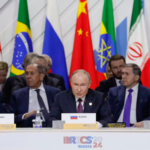Many superpower states use soft power strategies through cultural industries to expand their sphere of influence and hegemony, leading to the internal system’s power shifts. US soft power policies significantly contributed to establishing America’s hegemony in unipolar world order. However, the global community is witnessing a transformation towards a multipolar world order due to the rise of several middle powers, including China, Japan, India, Brazil and South Africa. As an aspiring state, China implemented several strategic and economic initiatives such as BRI. China encourages the strength of “borderless” industries to integrate its economy into the global market.
Several countries have used cinema, music, and art to spread their soft power and hegemony worldwide. China also started using soft-power tools, especially towards the global south, to strengthen its strategic interests. Since 2003, the Chinese film industry has been seen as a vital instrument for soft power. As a result of the industry’s significant change, new tactics and methods to strengthen Chinese soft power have been developed.
Korean Soft Power – A Recent Sensation
In 2023, Korean dramas (K-dramas) remained the most popular genres, enthralling viewers all over the world, beginning with Song Hye Kyo’s exciting finale of “The Glory” and culminating with the eagerly awaited premiere of “Gyeongseong Creature,” starring Park Seo Joon. According to a Pew Research Centre survey, Americans’ favourable opinion of South Korean drama had risen sharply from 31% in 2003 to 77% in 2020. A similar trend towards K-drams is witnessed in countries including the UK, Australia, and France.
Like South Korea, China has also started spreading its sphere of influence through cinema. The Chinese film industry achieved a significant milestone in 2017 when box office receipts increased to 8.6 billion US dollars. Over 50% of the Chinese market comprised domestic film production, accelerating this expansion. Since 2012, annually, China has exported more than 100 of these productions, which were dubbed into the native languages of Asia, Africa, and Central and Eastern European states, which widened the Chinese film industry.

China’s soft power influence on the international scene has grown due to the Chinese film industry. Soft power protects China’s three main interests, including the political system, economic growth, and territorial sovereignty, by reorienting attention away from rigidly constrained social policies and towards President Xi Jinping’s vision of a new global order and a shared future for all people.
A Propagandist CCP
The historical events portrayed in the Chinese film “800,” which tells the story of the Battle of Shanghai during the Sino-Japanese War, have caused criticism. Some contend that the movie shows a bias in favour of the conflict. At first, the nationalist army was commanded by the Republic of China, which was the official government. Despite not being the main fighting force in the Sino-Japanese War, the Chinese Communist Party (CCP) later claimed responsibility for the victory. The CCP has painstakingly constructed a narrative in textbooks and museums to support this claim, portraying itself as the primary force behind the triumph and demonstrating how Chinese cinema was used by the CCP to further its ideology.

Another such incident comes into the picture in the book “The Grand Master of Demonic”; the central theme of the book is a same-sex romance. However, a key element was significantly altered to adhere to Chinese government censorship laws when it became a live-action drama. The two male protagonists’ romantic relationship was reduced to a platonic friendship, departing from the work’s original intent.
This change, which was required for political reasons, undermined the adaptation’s impact and authenticity, ultimately making it less valuable as an accurate depiction of the original plot. In China, even the well-known television program “F.R.I.E.N.D.S.” was subject to censorship. Long-time viewers saw that some sequences, especially those involving Ross’s gay ex-wife Carol, were missing. It is not a one-time event; consider this: Chinese artists’ desire to create and the Chinese government’s alteration or censorship of their works substantially impact their artistic freedom.
China’s worries over Western ideological infiltration conflict with its desire – and fear – to defend its cultural dominance globally. It might be reluctant to fully embrace cultural interaction if it opens up to outside influences because doing so could jeopardise its internal stability.
According to a Pew Research study conducted in May 2022, most respondents in 17 wealthy countries had unfavourable opinions about Chinese drama, particularly those in nearby nations like Australia and Japan. According to the survey, the views of foreigners in China have significantly deteriorated recently. China’s strategy of leveraging soft power to create a global community is perplexing and contentious. For instance, the Belt and Road Initiatives (BRI) have been heavily criticised for promoting neo-colonialism and debt-trapping.
Even though, at the 17th Party Congress in 2007, former President Hu Jintao emphasised the importance of soft power, China subsequently invested over $10 billion annually in soft power projects. Still, it hasn’t shown any noticeable or quantifiable progress.

Ballet and other traditional arts were employed as political brainwashing tools by the Chinese government. ‘Mao’s Last Dancer’ The film tells the tale of Li Chunxin, a teenage dancer who is compelled to attend a government-run institution to study ballet. To shape the ideology, Madam Mao redirected ballet’s emphasis from conventional forms to politically charged dance plays like “The Red Detachment of Women.” Artists who opposed these changes suffered persecution. Li Chusaid himself said, “In the west, I felt so free.’’
Under Madam Mao, During the Cultural Revolution, eight performances were officially selected as the ‘Revolutionary Sample Shows,’ consisting of ballet, Peking Opera, and a symphony.
Although external packaging may draw attention, the internal substance is the foundation of the long-lasting influence of China’s cinematic approach. China must examine its policies and practices in detail to make cinema without political propaganda censorship and make its soft power impactful worldwide.






